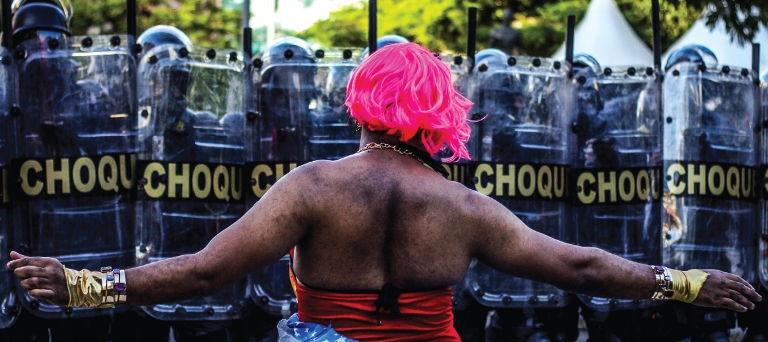(English bellow)
Muestra que el derecho a la manifestación está amenazado tanto por las prácticas históricas de reprimir y perseguir judicialmente a los manifestantes y líderes sociales, como por nuevas tendencias que recrudecen este panorama e incluyenla criminalización deacciones de protesta a través de reformas normativas y legislativas.
La publicación está centrada en cuatro ejes: las restricciones legales y administrativasa las manifestaciones públicas, la represión y el uso de la fuerza, la criminalización de la protesta y la impunidad de la violencia policial. Se profundiza en temas vinculados con los conflictos de tierra y territorio, la intervención de las fuerzas armadas en la protesta social, la falta de investigación y sanción de las violaciones a los derechos humanos en las manifestaciones y el impacto de las leyes antiterroristas. También se analizan la violencia policial contras las mujeres y los habitantes de las zonas rurales y las prácticas estatales racistas.
Los Estados suelen utilizar la fuerza para contener y controlar las manifestaciones públicas, en vez de tomar medidas para garantizar el ejercicio de derechos y resolver los problemas de fondo.
En Colombia, el Escuadrón Móvil Antidisturbios (ESMAD) de la Policía Nacional es señalado como responsable de 448 casos de agresiones que abarcan a 3 950 víctimas entre 2002 y 2014. Entre estos casos, hubo 13 ejecuciones extrajudiciales, 137 lesiones, 91 detenciones arbitrarias, 107 amenazas y 2 episodios de violencia sexual, según la base de datos del Centro de Investigación y Educación Popular CINEP.
En la conclusión del informe se reflexiona sobre cómo los Estados pueden evitar situaciones de violencia en las protestas mediante protocolos, leyes e interpretaciones judiciales protectoras de derechos. Se destacan en ese sentido las pautas delineadas por el Consejo de Derechos Humanos de la ONU y la Comisión Interamericana de Derechos Humanos (CIDH).
*******************
New report: Latin American State Responses to Social Protest
Today, ten human rights organizations from eight countries – Argentina, Brazil, Chile, Colombia, Mexico, Paraguay, Peru and Venezuela – present a joint report that reflects our concern about policies that foster violent state responses to social protest. The document shows that the right to demonstrate is threatened by the historical practices of repressing and prosecuting protesters and social leaders as well as by new, aggravating trends, such as using regulatory and legislative reforms to criminalize protest-related actions.
The report is organized around four central themes: legal and administrative restrictions on demonstrations, repression and the use of force, the criminalization of protest, and the impunity of police violence. It delves into issues such as land and territorial conflicts, the intervention of the Armed Forces in social protests, the lack of investigation and sanction of human rights violations in demonstrations, and the impact of anti-terrorism laws. Police violence against women and rural residents are also specifically analyzed, along with racist state practices.
States often use force to contain and control public demonstrations, rather than taking measures to guarantee the exercise of rights and to resolve the underlying issues.
In Colombia, the National Police Anti-Riot Mobile Squadron (ESMAD in Spanish) has been held responsible for 448 cases of aggression, affecting 3,950 victims between 2002 and 2014. These cases include 13 extrajudicial executions, 137 injuries, 91 arbitrary detentions, 107 threats and two episodes of sexual violence, according to the database of the Center for Popular Research and Education (CINEP in Spanish).
The report’s conclusions reflect upon how states can avert violence during protests through protocols, laws and judicial interpretations that protect rights. In this vein, they highlight the standards set forth by the UN Human Rights Council andthe Inter-American Commission on Human Rights (IACHR).



